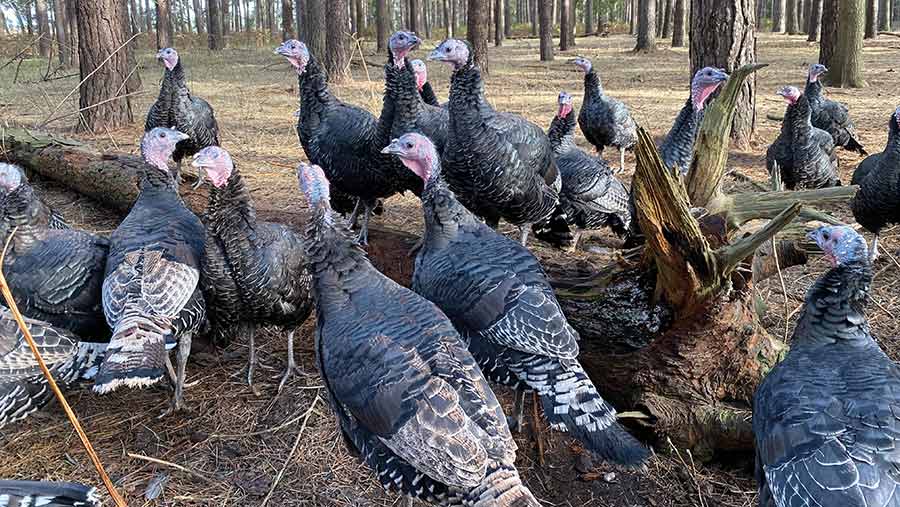Turkey farmer faces surplus as buyers turn to frozen birds
 © Mark Gorton
© Mark Gorton A Lancashire turkey farmer is facing a surplus of free-range turkeys this Christmas after panicked shoppers turn to buying frozen turkey.
Paul White, a partner at Paul’s Turkeys, based in Colne, Lancashire, said widespread media reports of a shortage of turkeys this Christmas had caused shoppers to switch to stocking up on cheaper frozen turkey from supermarkets.
See also: Half of UK free-range Christmas turkeys lost to avian flu
“The coverage of the shortage has only further impacted us. It’s scared the public, and frozen turkey sales have risen dramatically, because people want to make sure they’ve got a turkey in their freezer for Christmas,” said the farmer, writing on his LinkedIn account.
“It being British-reared, or its welfare, has mattered less. That means that people like us have lots of turkeys left.”
Mr White said there was there was “no shortage” at his farm. In fact, he has hundreds of unsold fresh birds in the field.
“We have lots of heritage, ethically reared, free-range turkeys left, that we have sweated, cried and slogged our guts out over,” he added.
“We’re starting to really worry. We take great pride in how we take care of our birds, and there have been many sleepless nights.”
THE TRUTH ABOUT THE TURKEY SHORTAGE- PLEASE SHARE
There has been a LOT of coverage about the free range turkey shortage, and there being 50% less turkeys available this year, and it’s having a severe impact on small scale producers. pic.twitter.com/IWw7i2UtQA
— Paul White (@JustPaulWhite) November 30, 2022
Mr White urged consumers to consider shopping around and supporting British small-scale turkey producers rather than relying on what was available on supermarket shelves.
Paul Kelly, who runs Kelly Turkey Farms, in Danbury, Essex said the spread of avian flu – the worst ever in the UK – had been “devastating” and there will be a “big, big shortage of free-range turkeys on supermarket shelves this year”.
Speaking at an Environment, Food and Rural Affairs select committee hearing, which is investigating the current avian flu outbreak, Mr Kelly said modern strains of the disease killed birds so rapidly that the compensation scheme was “no longer fit for purpose”.
His business has lost £1.2m this year alone, after birds died due to avian flu but were not covered under the government’s current compensation scheme. Currently, it only pays compensation for healthy birds, showing no signs or symptoms, of the disease at the time of culling.
However, the highly pathogenic strains kill birds in days. By the time vets arrive, whole flocks may have been wiped out and compensation for any birds that survive is negligible, Mr Kelly said. The effect is that turkey businesses are being wiped out, he added.
Fears over 2023 turkey crop
Mr Kelly said the lack of the safety net was also dissuading turkey producers from taking a risk from restocking. That meant fears over Christmas turkey shortages could extend to next year’s crop.
“Without a vaccine or a compensation scheme in place, I don’t know whether I will have the confidence to grow turkeys in 2023,” he said.
British Poultry Council chief executive Richard Griffiths said reports indicated that many seasonal producers, particularly free range, will not restock.
Of the free-range flock, 600,000 or half of the 1.2 million birds had been killed this year. Overall, about one million of the 8-9 million turkey population had been lost directly to the disease or through culling to control its spread, Mr Griffiths told MPs.
While big retailers were able to draw in supplies from a range of flocks, local butchers supplied by single flocks had been left without any Christmas birds to sell at all, he suggested.
Back British farming and buy turkey from local producers
The NFU is urging the public to support British turkey producers by buying their turkeys from local producers this Christmas through the Turkey Finder.
By sourcing a turkey from your local producer, you’ll be getting a high-quality bird that has been raised to world-leading standards, at the same time as cutting your own food miles and supporting the rural economy.
If you choose to buy your turkey from a supermarket, don’t forget to look for the Red Tractor logo on the packaging.
